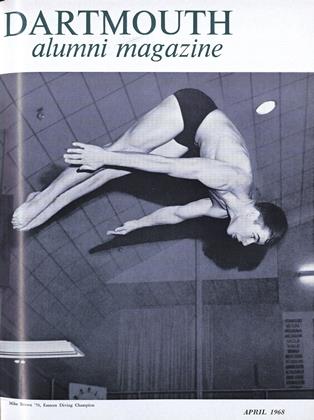If you invite HENRY G. McDONOUGH '26 to dinner don't serve him chicken a la king.
As New York's Bronx County Democratic Chairman he has probably had his fill of it on the after-dinner speech circuit. But he'll be willing to talk politics no matter what he eats. The New York Times says he speaks with the syntax of a Dartmouth man in the Bronx patois.
McDonough heads 4200 committee members from 978 election districts in what has been called the country's toughest Democratic stronghold - even stronger than New York County (Tammany Hall) of which it was a part until 1914. He served as chairman of the law committee, then as treasurer until 1966 when he succeeded the late Charles A. Buckley as chairman of the county's executive committee.
The national significance of this elective office is mentioned by Theodore H. White in The Making of thePresident. He credits Buckley as one of a handful of principals responsible for Kennedy's election.
A straightforward pro, McDonough is from a Bronx family where there was always lots of political discussion at home. At Dartmouth he majored in political science. He says: "I can remember Professor James Parmalee Richardson saying in class that it was the duty of everyone to get active in the party of his choice."
After Dartmouth McDonough worked us a milkman to earn money for Fordham Law School nights. While a law student in 1928 he was active with the speakers' bureau for Al Smith.
Are politics and law good bedfellows? "I think it's a natural," he says. "Look at our founding fathers. Most of them were lawyers. They're trained to think and to speak on their feet."
But he criticizes the political fact that everyone looks to lawyers. "It's a great field for businessmen, too," he adds. "I wish more of them would take part."
It's rare now that McDonough goes to his law office, McDonough, Schneider, & Marcus, but he keeps up with the law as counsel to the county's Public Administrator. The problems of his constituency stretch most of McDonough's days till 10 or 10:30 - trips to Washington to investigate rehabilitation projects, attempts to replace an antiquated transportation system, encouraging businessmen to move into the Bronx, fighting the reformers who are trying to take over the organization, and the speech-making and dinner meetings.
"That's the way it is even in a nonelection year," he claims.
Bronx residents are overwhelmingly Democratic more than 80 per cent. About 28 per cent of the population is Negro and Puerto Rican. McDonough admits that not a great percentage of these minorities are registered, but more and more are registering. Some of them attend courses given in the Democratic clubs in the twelve assembly districts.
McDonough comes up for reelection in June. If he wins he'll be working even harder — on the presidential campaign.
 View Full Issue
View Full Issue
More From This Issue
-
 Feature
FeatureFinancial Gaposis?
April 1968 -
 Feature
FeatureThe DOC: A Learning Experience
April 1968 By Jack Noon '68 -
 Feature
FeatureMaster Translator
April 1968 -
 Feature
FeatureArt Collector and Author
April 1968 -
 Feature
FeatureA NEW LOOK ON THE INN CORNER
April 1968 -
 Article
ArticleNick Jacobson '35, Playwright
April 1968 By ALEXANDER LAING '25
Features
-
 Feature
FeatureEarly X-rays, Missing Skulls and Frozen Pizza
DECEMBER 1997 -
 Feature
Feature30,000 Dartmouth Men Are Her Friendsand Problems
December 1961 By CLIFFORD L. JORDAN '45 -
 Cover Story
Cover StoryHOW TO IMPROVE YOUR VISION NATURALLY
Sept/Oct 2001 By GLEN SWARTWOUT '78 -
 Feature
FeatureDARTMOUTH SONGS
FEBRUARY 1963 By HAROLD F. BRAMAN '21 -
 Feature
FeatureWhitewater Racing Gains New Status
OCTOBER 1969 By JAY EVANS '49 -
 Cover Story
Cover StoryHOW TO HOOK VIEWERS WITH AN ADDICTIVE SOAP OPERA STORYLINE
Jan/Feb 2009 By JEAN PASSANANTE '75

